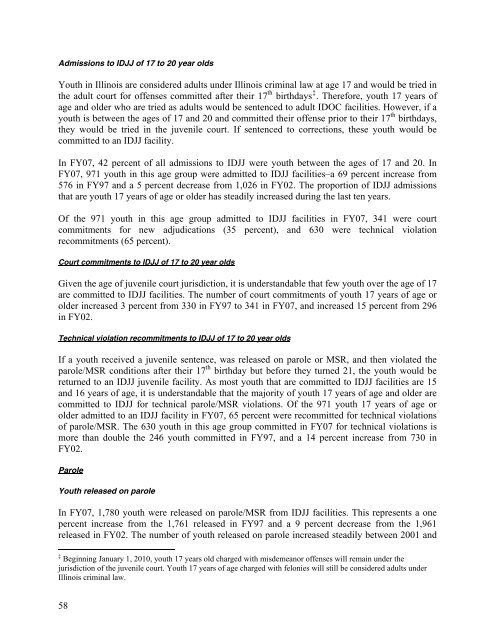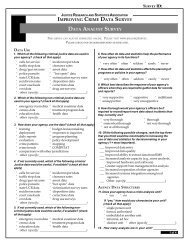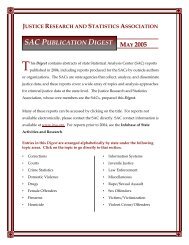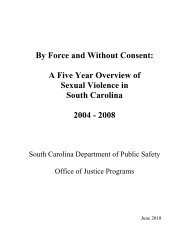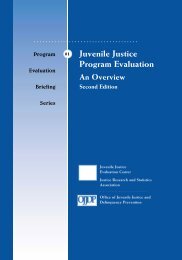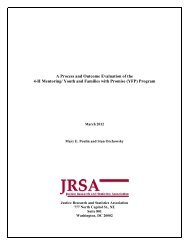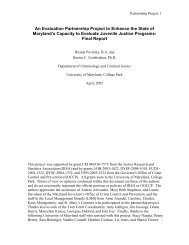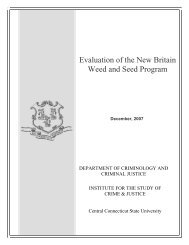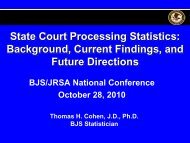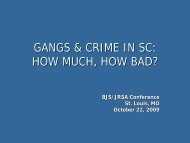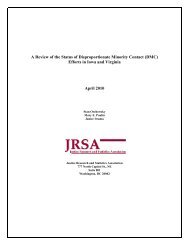Juvenile Justice System and Risk Factor Data - Illinois Criminal ...
Juvenile Justice System and Risk Factor Data - Illinois Criminal ...
Juvenile Justice System and Risk Factor Data - Illinois Criminal ...
You also want an ePaper? Increase the reach of your titles
YUMPU automatically turns print PDFs into web optimized ePapers that Google loves.
Admissions to IDJJ of 17 to 20 year olds<br />
Youth in <strong>Illinois</strong> are considered adults under <strong>Illinois</strong> criminal law at age 17 <strong>and</strong> would be tried in<br />
the adult court for offenses committed after their 17 th birthdays ‡ . Therefore, youth 17 years of<br />
age <strong>and</strong> older who are tried as adults would be sentenced to adult IDOC facilities. However, if a<br />
youth is between the ages of 17 <strong>and</strong> 20 <strong>and</strong> committed their offense prior to their 17 th birthdays,<br />
they would be tried in the juvenile court. If sentenced to corrections, these youth would be<br />
committed to an IDJJ facility.<br />
In FY07, 42 percent of all admissions to IDJJ were youth between the ages of 17 <strong>and</strong> 20. In<br />
FY07, 971 youth in this age group were admitted to IDJJ facilities–a 69 percent increase from<br />
576 in FY97 <strong>and</strong> a 5 percent decrease from 1,026 in FY02. The proportion of IDJJ admissions<br />
that are youth 17 years of age or older has steadily increased during the last ten years.<br />
Of the 971 youth in this age group admitted to IDJJ facilities in FY07, 341 were court<br />
commitments for new adjudications (35 percent), <strong>and</strong> 630 were technical violation<br />
recommitments (65 percent).<br />
Court commitments to IDJJ of 17 to 20 year olds<br />
Given the age of juvenile court jurisdiction, it is underst<strong>and</strong>able that few youth over the age of 17<br />
are committed to IDJJ facilities. The number of court commitments of youth 17 years of age or<br />
older increased 3 percent from 330 in FY97 to 341 in FY07, <strong>and</strong> increased 15 percent from 296<br />
in FY02.<br />
Technical violation recommitments to IDJJ of 17 to 20 year olds<br />
If a youth received a juvenile sentence, was released on parole or MSR, <strong>and</strong> then violated the<br />
parole/MSR conditions af ter their 17 th birthday but before they turned 21, the youth would be<br />
returned to an IDJJ juvenile facility. As most youth that are committed to IDJJ facilities are 15<br />
<strong>and</strong> 16 years of age, it is underst<strong>and</strong>able that the majority of youth 17 years of age <strong>and</strong> older are<br />
committed to IDJJ for technical parole/MSR violations. Of the 971 youth 17 years of age or<br />
older admitted to an IDJJ facility in FY07, 65 percent were recommitted for technical violations<br />
of parole/MSR. The 630 youth in this age group committed in FY07 for technical violations is<br />
more than double the 246 youth committed in FY97, <strong>and</strong> a 14 percent increase from 730 in<br />
FY02.<br />
Parole<br />
Youth released on parole<br />
In FY07, 1,780 youth were released on parole/MSR from IDJJ facilities. This represents a one<br />
percent increase from the 1,761 released in FY97 <strong>and</strong> a 9 percent decrease from the 1,961<br />
released in FY02. The number of youth released on parole increased steadily between 2001 <strong>and</strong><br />
‡ Beginning January 1, 2010, youth 17 years old charged with misdemeanor offenses will remain under the<br />
jurisdiction of the juvenile court. Youth 17 years of age charged with felonies will still be considered adults under<br />
<strong>Illinois</strong> criminal law.<br />
58


